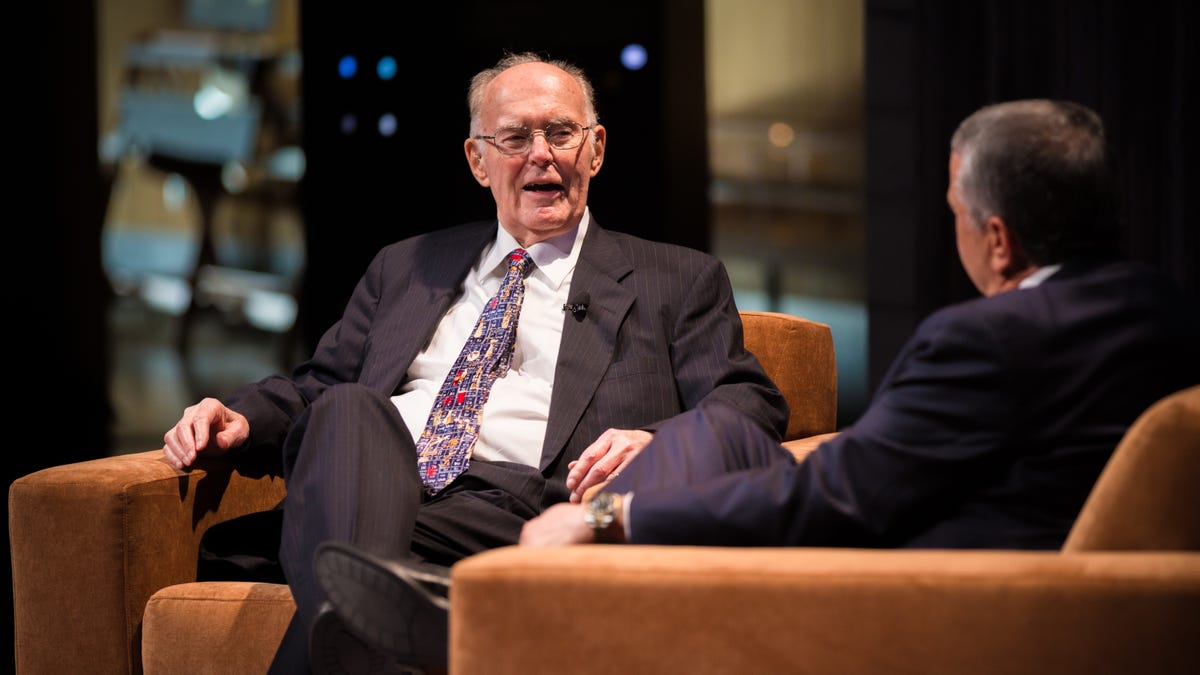 Enlarge Image
Enlarge ImageJames Martin/CNET
SAN FRANCISCO — The man behind Moore’s Law says he’s “amazed” his prediction about technology advancements has lasted so long.
Gordon Moore, speaking at an event Monday celebrating the 50th anniversary of his theory that processor power improves exponentially every two years, said when he made the prediction in 1965, he was only looking 10 years out, not multiple decades.
“I had no idea it was going to turn out to be a relatively precise prediction,” Moore said. To keep his theory going, Moore said, “will take a lot of good engineering.”
“The next five or 10 years is reasonably clear, and that’s usually the case,” Moore said. “You can usually see a few generations in the future. … I still hope Brian [Krzanich, Intel’s CEO] has enough good engineers working on the problem we won’t hit a dead end.”
See more of CNET’s Moore’s Law coverage:
- Moore’s Law is the reason your iPhone is so thin and cheap
- Inside the multibillion-dollar quest to make faster, cheaper gadgets
- Adios, silicon: Why exotic designs are the future for the chips in your gadgets
- Samsung, in a race to build your next smartphone chip, may just win
Moore is the brains behind Moore’s Law, the idea that chips double in complexity about every two years as processor components shrink and become more tightly packed. The prediction about future technology — which is what allows our smartphones to continuously get thinner, faster and more energy efficient — still holds true 50 years after it was first posited. But Moore’s Law also is facing some hurdles, particularly that it’s getting more difficult and expensive to develop more advanced processors.
In 1966, a new chip plant cost $14 million. In 1995, the price tag was $1.5 billion. Today, it can cost as much as $10 billion — roughly the annual gross domestic product of Mongolia. To cope, semiconductor manufacturers are finding ways to stretch today’s silicon technology while researching alternatives.
Keeping Moore’s Law going is vital for the technology industry. Each generation of processors has enabled inventions such as the Internet and smartphones and has made computing more accessible to mainstream consumers. In the future, more complex chips will power everything from wearable technology to smart homes. If processor advancement stops, the next great innovation that changes the way we live and communicate may never happen.
Visiting the places that make Moore’s Law happen (pictures)






Moore on Monday said he’s “disappointed” that the US federal government has decreased its funding for basic scientific research, something that gives other higher-spending countries an advantage.
He noted that he couldn’t have predicted social networking or that other software, such as Google Earth, would be capable of so much yet cost nothing for consumers. And “the importance of the Internet surprised me.”
“To me it looked like it was going to be another minor communications network that solved certain problems,” Moore said.
“We’ve just seen the beginning of what computers are going to do for us,” he added.
Tom Friedman, New York Times columnist and author of “The World is Flat,” interviewed Moore, a co-founder of Intel, in front of an audience of journalists, technology industry executives and others. Krzanich, the current CEO of the semiconductor giant, gave opening remarks during the event at San Francisco’s Exploratorium museum.
Moore, when asked what he has learned from Moore’s Law, said to a laughing crowd: “I guess one thing I’ve learned is once you make a successful prediction, avoid making another one.”




